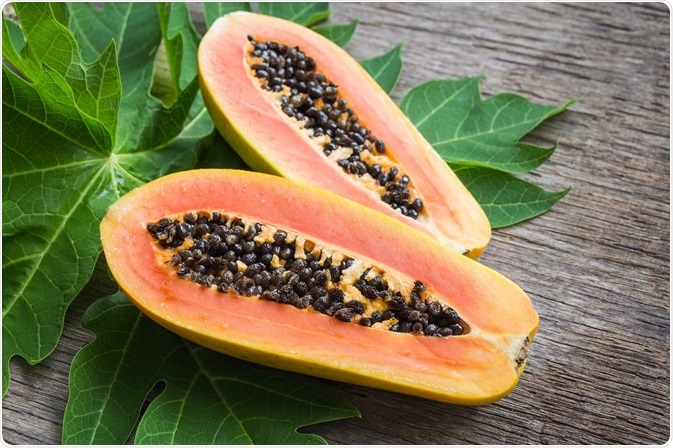The papaya or pawpaw (Carica papaya) is a tropical fruit, which has been consistently associated with numerous medicinal properties. One of the most important of these claims is the ability of papaya leaf extract to revert low platelet counts to normal in dengue fever.
 Credit: Still AB/Shutterstock.com
Credit: Still AB/Shutterstock.com
The platelet count in dengue is officially classified as a warning sign of severe dengue, but it can predict the severity of the illness, as well as being a marker for vascular protein leakage and liver damage, and thus of mortality.
Several researchers have tested preparations of papaya leaf, in particular, in regard to the platelet count. One systematic review confirmed the increase in platelet count to be more significant in the group that received the extract than in the control group.
Mechanism
The leaf extract of papaya, prepared from dried or fresh ground leaves, possesses many compounds, such as flavonoids and other plant phenols, and alkaloids for example carpaine, anthraquinone, saponins, and cardiac glycosides, such as carposide, and tannins. Thus, it is rich in antioxidant and free radical scavenging activity, as well as being able to stabilize the RBC membrane. It may therefore have a protective role against hemolysis in stressful conditions.
The dengue virus can induce a low platelet count by suppressing the bone marrow via circulating interleukin levels produced by activated immune cells. The virus gravitates towards monocytes and macrophages and the endothelial cells, drawing nutrition from them.
As a result, focal apoptosis and even necrosis may be observed, leading to their infection, platelet aggregation, and peripheral destruction of platelets. Vascular permeability increases, because of the proinflammatory factors, as complement activation is also a result of the inflammatory cascade.
One study showed that papaya leaf extract is capable of neutralizing plasma containing dengue virus and reduces platelet aggregation significantly.
- The extract of papaya leaves has been shown to increase ALOX12 (arachidonate 12-lipoxygenase or platelet type lipoxygenase) by 15 times. This enzyme promotes platelet production via the increased number and differentiation of megakaryocytes.
- The platelet-activating factor receptor (PTAFR) gene is platelet specific and is increased 13.5-fold following the administration of the extract as compared to controls.
- Serine protease NS2B and NS3 are vital in dengue virus replication, but these are inhibited by quercetin, one of the flavonoids in papaya leaves. This extract thus prevents viral assembly. One study showed that the oral administration of papaya leaf extract was associated with an early rise in platelet count even as soon as 24 hours. There was a significant rise in the total WBC count.
Areas of concern
The poor reporting of most trials, with respect to the disease and patient parameters, makes the quality of available evidence quite low. Yet, considering the objective nature of the single parameter that is focused upon, namely, the platelet count, it is considered likely that the evidence may be significant support for further research into the clinically important, as opposed to the statistically significant, properties of this extract.
Again, safety data need to be measured and reported appropriately before recommendations can be made with regard to this extract.
Further Reading
Last Updated: Feb 26, 2019